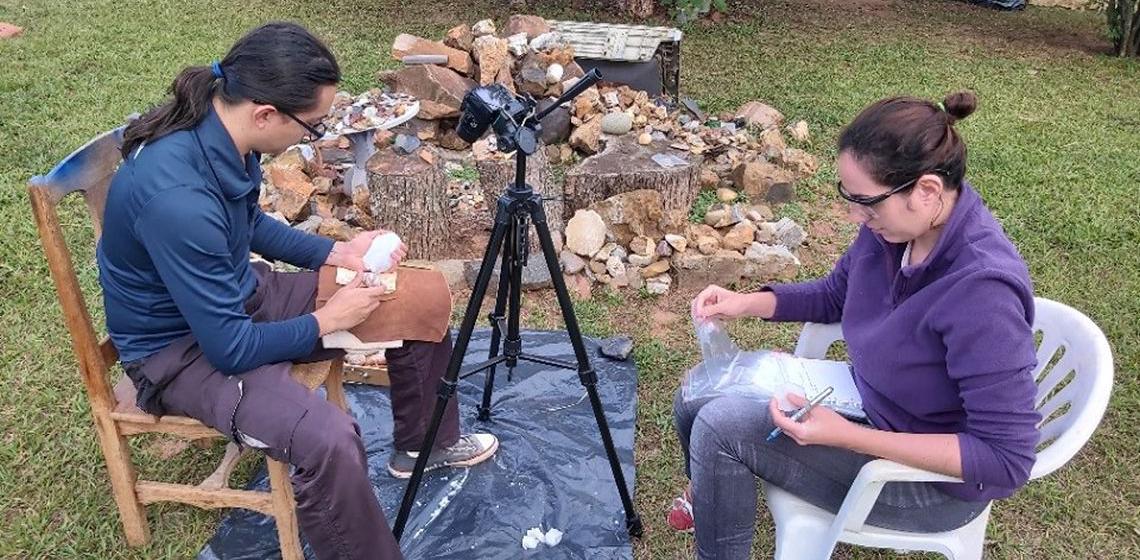
The University of São Paulo (USP) (founded in 1827) is the biggest university in Brazil and the most prestigious in Latin America. The Laboratory for Human Evolutionary Studies (LEEH), leaded by Mercedes Okumura (since 2018), is run by the Institute of Biosciences and the only one in Latin America dedicated to the study of Human Biocultural Evolution.
Our research focus on the biocultural evolution of past human groups, mostly through the analysis of human skeletons, faunal remains, pottery, and stone tools. Currently, experimental archaeology is part of our main research projects, including the replication of stone and bone tools produced by ancient hunter-gatherer groups in the Americas, and by Paleolithic groups from Southern Europe, Northern Africa, and the Middle East. The replication of such tools aims to further understand the lithic and bone technology of the past, as well as to produce reference collections.
People Behind
Prof. Dr. Mercedes Okumura
Function: Lecturer
E-mail: okumura@ib.usp.br
Expertise: Bioarchaeology, Biocultural evolutionary studies
Bio: Mercedes Okumura holds a Bachelor’s degree in Biological Sciences (2000), a MPhil (2003) and a PhD (2007) by the Institute of Biosciences, University of São Paulo (BR). From 2006 to 2010, she worked as a research-curator at the Leverhulme Centre for Human Evolutionary Studies (U. of Cambridge, UK). From 2010 to 2014, she was a postdoctoral researcher at the Museum of Archaeology and Ethnology at the University of São Paulo (BR). In the next four years (2014-2018), she worked as a lecturer in Archaeology at the National Museum (Rio de Janeiro, BR). Since 2018, she is the PI of the Laboratory for Human Evolutionary Studies (LEEH), located at the Institute of Biosciences, University of São Paulo (BR). She is also an Honorary Research Fellow at the University of Exeter (UK).
Dr. João Carlos Moreno de Sousa
Function: collaborator
E-mail: jcmoreno@furg.br
Expertise: Lithic technology; experimental archaeology; early occupation of the Americas; science communication; human biocultural evolution
Bio: João Carlos Moreno (Bogotá, 1989) studied archaeology at Institute of Prehistory and Anthropology of Goiás, in the Pontifical Catholic University of Goiás (BR). He obtained a Master’s Degree at the Museum of Archaeology and Ethnology, University of São Paulo (BR). In 2019, he obtained a PhD at the National Museum, Federal University of Rio de Janeiro (BR), and part of his PhD was carried out in the University of Exeter (UK), working closely with Bruce Bradley at the Laboratory of Experimental Archaeology. The Masters’ Degree and the PhD projects were both funded by CAPES.
From 2010 to 2022, he held a postdoctoral position at the Laboratory for Human Evolutionary Studies, Institute of Biosciences, University of São Paulo (BR), were he keeps being a collaborator. His research project is funded by the São Paulo Foundation for Research (Fapesp). In 2022 he got a professor position at the Federal University of Rio Grande and created the Laboratory for Evolutionary and Experimental Archaeology and Prehistory.
His research focus is lithic technology and replication of lithic collections, through experimental archaeology.
Most of his research is centered on the Paleoamerican/Paleoindian cultures, although he has been regularly part of projects dealing with lithic industries from different periods in the Americas and Europe. Regarding teaching at the Federal University of Rio Grande, he is responsible for the following chairs: Methodology of Archaeological Research 1 (Survey); Methodology of Archaeological Research 2 (excavation and rock art); Lithic Technology; Brazilian Precolonial History; Regional Pre Colonial Histories; Science Communication and Archaeology; Experimental Archaeology.
Gabriela Sartori Mingatos MA cand. PhD
Function: Collaborator/PhD candidate (Archaeology) at the National Museum (Rio de Janeiro), co-supervised by Dr. Mercedes Okumura
E-mail: gabriela.mingatos@gmail.com
Expertise: zooarchaeology; experimental archaeology; bone tools technology
Bio: Gabriela Sartori Mingatos (São Paulo, 1986) studied History at UNINOVE University and Social Sciences at the Federal University of São Paulo. She obtained Master’s Degree at the National Museum, Federal University of Rio de Janeiro (BR), the same institution where she is carrying out her current PhD project. The MPhil and the PhD projects were both funded by CAPES and FAPERJ.
Since 2012 she is a collaborator in the Laboratory for Human Evolutionary Studies, Institute of Biosciences, University of São Paulo (BR).
Her research focus is Zooarchaeology (diet and bone technology), and replication of bone collections, employing experimental archaeology.
Most of her work is centered on the Paleoamerican/Paleoindian cultures, especially in diet and taphonomy, but regularly deals with bone industries and faunal remains from distinct periods in Brazil.
She is currently involved in the analysis of diet and bone industry changes through time and replication of bone tools from hunter-gatherers from Southeastern and Southern Brazil.
